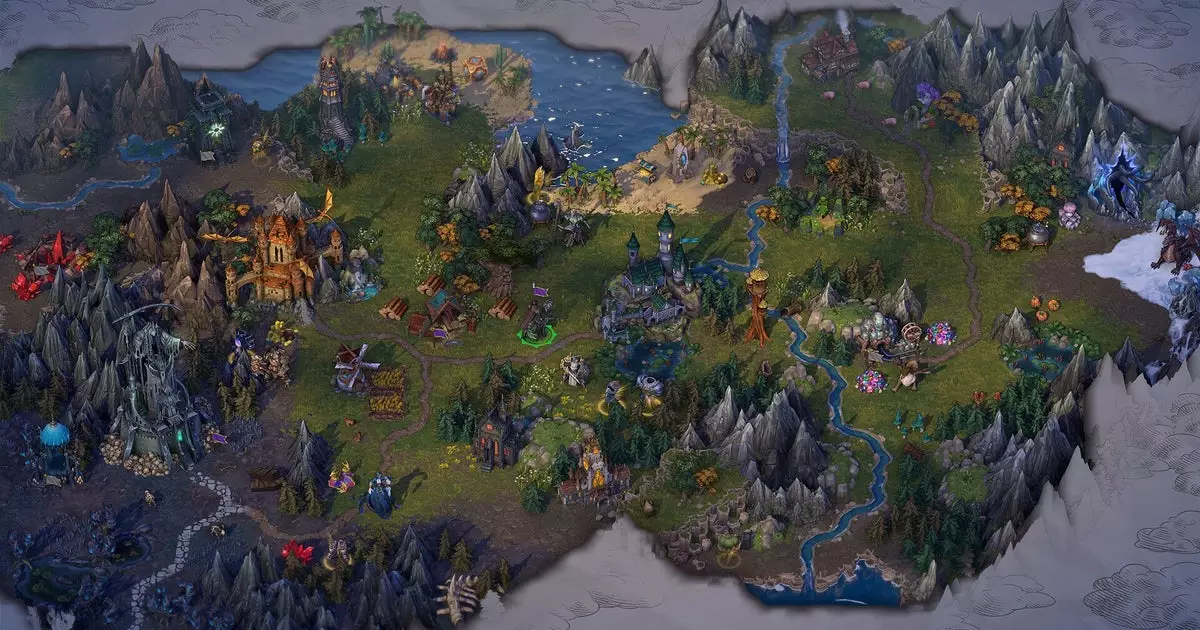In the ever-evolving universe of video game publishing, decisions that seem small at first glance often reveal larger strategic calculations. Ubisoft’s decision to delegate the publishing responsibilities of its upcoming fantasy strategy title, *Heroes Of Might And Magic: Olden Era*, to Hooded Horse exemplifies this phenomenon. While at face value, it might appear an administrative maneuver, the deeper implications speak volumes about the shifting dynamics within the gaming industry. This move underscores not just Ubisoft’s ongoing internal restructuring, but also highlights how publishers seek to adapt in a volatile market that rewards flexibility and strategic partnerships.
Primarily, Ubisoft appears to be recalibrating its publisher business model to maximize efficiency and reach. The rationale for transferring publishing duties isn’t explicitly transparent, but a critical analysis suggests a desire to leverage specialized expertise. Hooded Horse, a boutique publisher with a focus on strategic and management sims like *Manor Lords* and *Norland*, offers a niche skill set that aligns perfectly with the ambitions for the *Heroes* franchise. This isn’t simply a cost-saving measure but a strategic realignment – Ubisoft recognizes that not every title benefits from its sprawling corporate infrastructure, especially legacy franchises that require a nuanced, community-centric approach.
Decoding the Partnership: Why Hooded Horse?
One might question why Ubisoft, a gaming giant with immense resources, would entrust a smaller, perhaps less well-known publisher with a beloved franchise. The answer lies in specialization and the current industry trend: hyper-focus on core areas. Hooded Horse’s reputation in the strategy community is built on quality, community engagement, and targeted marketing. By partnering with them, Ubisoft ensures the game receives the kind of dedicated attention that big publishers sometimes struggle to provide, especially for titles that appeal to a niche but fiercely loyal audience.
From Unfrozen’s perspective—the studio creating the game—outsourcing publishing operations to Hooded Horse also seems a pragmatic choice. The division of responsibilities allows developers to focus on creating compelling content while their publishing partner takes charge of marketing, regional distribution, and community outreach. This symbiotic relationship aspires to maximize the game’s potential reach and sales, leveraging Hooded Horse’s specialized expertise rather than stretching Ubisoft’s broader internal teams thinner.
Furthermore, this move signals a nuanced understanding within the industry: the value of strategic partnerships over traditional publishing dominance. It reflects a belief that smaller, focused publishers might have more agility and cultural insight into the strategy niche, which can translate into a more authentic and effective marketing campaign. For a franchise rooted deeply in nostalgia and tradition like *Heroes of Might and Magic*, resonating with the franchise’s core fanbase is paramount, and Hooded Horse’s community-centric approach may give it an edge.
The Future of Legacy Franchises and Industry Trends
Ubisoft’s decision to offload the publishing process, especially for a nostalgic prequel, also raises questions about the future of legacy IPs. The gaming industry’s current climate is one of rapid innovation, annualized releases, and shifting consumer preferences. Big publishers often find themselves balancing between leveraging their venerable franchises and managing logistical and financial risks.
By partnering withHud Hooded Horse, Ubisoft seems to be hedging its bets—preserving the franchise while minimizing risk. The split within Ubisoft itself—dividing into entities focusing on blockbusters like *Assassin’s Creed* and *Rainbow Six*, and others maintaining more traditional or experimental projects—reflects a larger trend of decentralizing control. This decentralization allows for more tailored marketing and innovation strategies suited to each franchise’s unique demands.
The announcement of *Heroes Of Might And Magic: Olden Era* as a return to the series’ roots indicates the importance of authenticity and nostalgia in current market trends. Yet, the game’s delay and the opaque reasoning behind Ubisoft’s strategic choices suggest that legacy titles are becoming increasingly complex to manage, both creatively and commercially. Outsourcing publishing could be viewed as a way to stay committed to tradition without overextending internal resources.
Implications for Strategy and Consumer Expectations
For fans and consumers, this move might be viewed skeptically. The core question remains: can Hooded Horse do justice to a cherished franchise, especially when compared to Ubisoft’s historical standards? While the publisher’s focus on niche markets offers hope, it also brings intrinsic risks—the potential for misaligned branding, marketing missteps, or a perceived reduction in quality control.
Nevertheless, this decision underscores an industry-changing sentiment: publishers are increasingly recognizing the value of specialized, boutique operations as essential cogs in the complex machinery of game publishing. It advocates a shift from monolithic control to collaborative platforms where expertise, community engagement, and regional reach are as important as the game’s core gameplay.
Ultimately, Ubisoft’s partnership with Hooded Horse signals a broader industry evolution—one favoring adaptability and niche specialization over traditional, centralized publishing models. While it remains to be seen whether this strategy will reap substantial rewards for the franchise, it undeniably represents a significant step in redefining how legacy titles are preserved, marketed, and received in an era characterized by rapid change and heightened consumer expectations.

